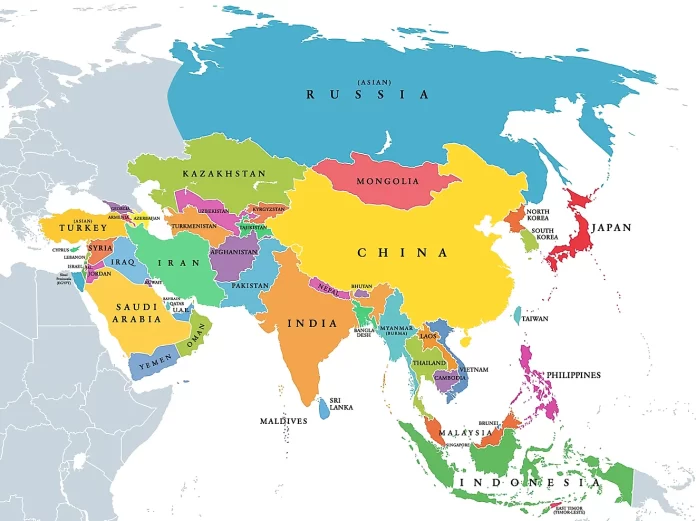Asia is the world’s largest continent both in terms of size and population. It has two highly populated countries in the world, China and India, and the three largest economies of the world – China, Japan, and India – also reside in this continent. Asia is also emerging as one of the world’s largest consumer markets due to its population. For many decades, it has been the most volatile continent of the world because of various regional conflicts that kept surfacing mainly for territorial reasons.
Once again, Asia is becoming a focal point of global attention as the two super powers, US and China, have conflicting positions on the Taiwan issue; China considers it an integral part of the country, while the US defends it as an independent country. These two opposite views have long been a point of contention between the countries, and more recently, they have caused them to experience significant tension.
Furthermore, there have been grave concerns of a possible outbreak of war between the USA and China ever since Nancy Pelosi, the House Speaker of the USA, decided to visit Taiwan despite warnings from China that it would resort to military action if Pelosi dared to go.
Nancy Pelosi has a history of being an unrelenting critique of China’s policy in dealing with Human Rights issues since she was a junior House member. She is known for unfurling a pro-democracy banner right at the Tiananmen Square in China, where local protestors had been executed two years prior by the Chinese government. Right before Pelosi’s recent visit to Taiwan, a well-known political analyst of USA, Thomas L. Friedman, made these remarks in his column, “I have a lot of respect for House Speaker Nancy Pelosi. But if she does go ahead with a visit to Taiwan this week, against President Biden’s wishes, she will be doing something that is utterly reckless, dangerous and irresponsible.”
Pelosi remained undeterred and went ahead with her plans to visit Taiwan on 2 August, 2022, despite threats from China and harsh criticism from the media and political opponents. She praised Taiwan as one of the freest societies in the world when she visited the Taiwanese Parliament. Although China did launch a missile in the waters off Taiwan shore, the very next day of her visit to express its anger, the world let out a sigh of relief when her tour concluded peacefully.. The ongoing economic war between USA and China took a new turn after this visit, the political issue long pursued by the USA and its western allies has been further deepened and can be defined as a conflict between two political systems – democracy versus dictatorship.
Last year, attending the 32nd anniversary of the Tiananmen Square massacre, Nancy Pelosi has said, “If we do not speak out for human rights in China because of economic concerns, then we lose the moral authority to talk about human rights in any other place in the world.” With a change in US policies towards China, these democratic values have become a far more important priority for the US officials.
Since the Korean war (1950-53), when the US had deployed its 7th fleet in the Taiwan Strait to thwart any possibility of Chinese attack on Taiwan, the US-Taiwan relation has remained complicated.
Later, the US also entered a defense treaty with Taiwan in 1954 that remained effective until US developed diplomatic relations with China in 1979. After establishing diplomatic relation with China, US withdrew diplomatic recognition of Taiwan, but soon after Taiwan Relations Act was passed by the US Congress, mandating the US to provide defensive weapons and “maintain the capacity of the United States” to essentially defend Taiwan.
With the development of US-China relationship, Taiwan gradually lost its recognition at the United Nations as a legitimate representative of China, having neither official membership nor observer status in the organization. Yet, Taiwan remains a thorn between the US-China relationship as any sign of favor to Taiwan from USA never goes well with China.
In 1995, the US had allowed Taiwanese president Lee Teng-Hui to visit his alma mater, Cornell University. China, in response, cancelled several meetings with the US and submitted its protest to the university as well. China’s reaction to Pelosi’s recent visit to Taiwan was a continuation of the same policy but with a grand show of its strength by firing missiles close to Taiwanese shores and holding large scale naval drills in the area.
The tensions triggered by this visit continue to affect US- China relationship as US sees China as its ‘biggest geopolitical challenge’ while China keeps realigning itself with other regional powers like Russia, Iran, Pakistan and some Central Asian countries, without desisting from its position of using force over Taiwan, if no peaceful integration of Taiwan is attainable. Reacting to a similar claim by Xi Jinping during his speech in the 20th Communist Party congress, Taiwan responded that it will not back down on its sovereignty or compromise on freedom and democracy. The US, on the other hand, is showing no sign of backing off from its position of providing defense weapons to Taiwan to avert any possible attack from China. After witnessing successful results of US weapons in Ukraine war, the US pushed Taiwan to purchase Himars to defeat China in the event of an invasion.
How these two radically opposite positions will be addressed by these two leading countries of the world is an issue keeping the world worried, as the possibility of even a minor mistake can lead to serious consequences which will be inconceivable at the moment.




